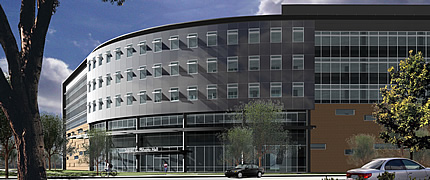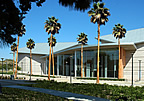Bond on the Ballot
Voters will determine fate of Proposition 1D on Nov. 7.
September 26, 2006
by Pamela McLaren and Paula Selleck
A $10.4 billion education bond will be among the measures Californians will consider when they go to the polls Nov. 7.
Proposition 1D, the Kindergarten-University Public Education Facilities Bond Act of 2006 would allocate $7.3 billion for K-12 and $3.1 billion for higher education.
Voter approval of Proposition 1D would bring $14.9 million to Cal State Fullerton for facilities that house academic programs. About $6.6 million would be used to equip and furnish Steven G. Mihaylo Hall, now under construction on the southeast corner of campus; another $6.6 million is targeted to upgrade or renovate aging facilities; and $1.7 million is needed for construction of a clinical and computing laboratory for nursing inside the Kinesiology and Health Science Building.
Mihaylo Hall, the future home of the College of Business and Economics, which serves nearly 7,500 students, will feature dual-purpose and “smart” classrooms “that will give faculty members access to all sorts of technology, including computers, DVD players, video and audio equipment,” said CBE Assistant Dean Joni Norby, whose responsibilities include planning how the college will use the new building.
“We want to provide a world-class education for business students, and to make that happen, the new building must have the latest technology for the use of our students and faculty members,” said Anil Puri, dean of the college.
Presently, faculty members and classes for the College of Business and Economics are scattered among five campus buildings. When construction for Mihaylo Hall is complete, its 230 faculty offices will make it possible to bring those from accounting, business writing, economics, finance, information systems and decision sciences, management and marketing together under one roof. The faculty members will leave existing furnishings behind for the new occupants of their current offices, while new desks, chairs and bookcases will be acquired for Mihaylo Hall.
The new building also will be home to the college’s 12 “centers of excellence,” which focus on academic research, as well as services for local businesses and the community at large. Other segments of the new building are student lounges and tutoring centers, plus an interactive networking lab and professional sales lab, where students in office settings will be able to videotape mock interviews and presentations for broadcast into their classrooms for analysis.
Improvements for and revitalization of existing buildings, meanwhile, is the focus of $6.6 million in bond funding. Heating, cooling, ventilation, electrical and plumbing systems in need of restoration or replacement are planned, along with improvements designed to boost energy efficiency and utility savings and also meet state accessibility requirements.
If approved by voters, the bond also would finance construction of a laboratory in the Kinesiology and Health Science Building for the university’s expanding graduate programs in nursing. Space for clinical practice, computing and faculty offices is included in the $1.7 million targeted for the new facility.
The bond measure, which requires a simple majority to pass, would authorize the sale of statewide general obligation bonds. Repayment of the bonds is guaranteed by the state of California and would be completed over 30 years.
Various business, civic and education groups, including the California Business Roundtable, California Chamber of Commerce, California Federation of Teachers, California Labor Federation, California School Boards Association, California Taxpayers’ Association, California Teachers Association, Campaign for College Opportunity, CSU Alumni Association, League of California Cities and Orange County Business Council support Proposition 1D.
There is no organized opposition to the bond measure at this time. Additional information is available online at www.SS.CA.gov.
Previous bond measures have provided funding for both construction and equipment for other campus facilities.
In March 2004, Californians approved Proposition 55. The measure provided $12.3 billion to schools throughout the state, including more than $50 million to Cal State Fullerton.
The funds that CSUF received were used for two projects — the construction of Mihaylo Hall and outfitting the newly opened Performing Arts Center.
Mihaylo Hall construction began in June. Completion is expected in 2008.
When the 109,000-square-foot Performing Arts Center opened in January,students and faculty members welcomed the fully outfitted performance, rehearsal, laboratory, studio and technical spaces.
Proposition 55 bond funds assisted in the purchase of stage lighting and audio systems, classroom computer and specialized equipment, scene shop power tools and related supplies, dance studio sound and video systems, concert grand pianos and percussion instruments and audio recording equipment.
“Without the equipment funds provided by Proposition 55, most of the building would not have been usable. The lighting, sound and specialized equipment acquired with bond funds were necessary to complete this project,” said Jerry D. Samuelson, dean of the College of the Arts.
California’s voters also approved Proposition 47, the Kindergarten-University Public Education Facilities Bond Act of 2002. That measure allocated $13 billion from the sale of general obligation bonds to K-12 schools, colleges and universities, including $17.4 million to Cal State Fullerton.
The greatest CSUF portion, $9.6 million, was used to enhance campus safety — installation of new fire hydrants, improved fire detection and alarm systems and an upgrade of the emergency notification system. At the time, the university was operating with alarm systems of varying vintage produced by 10 different manufacturers. These upgrades are continuing.
In addition, $6.7 million was earmarked for telecommunications infrastructure upgrades, including the installation of 40 additional Code Blue emergency telephones throughout the campus. The main project improved pathways, spaces and wiring needed to enhance instructional delivery and university operations.
The campus also received $987,000 for the purchase of equipment for the addition to the Kinesiology and Health Science Building. The addition, completed in 2003, features a wellness center with classrooms and laboratories for the teaching of biomechanics, physical assessment and motor behavior.



 Produced by the Office of Public Affairs at California State University, Fullerton.
Produced by the Office of Public Affairs at California State University, Fullerton.